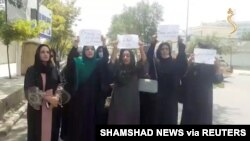When Abdullah Abdullah, head of the Afghan peace negotiation team, recently tweeted photos of his meeting with a group of Taliban leaders in Kabul, former parliamentarian and women's rights activist Fawzia Koofi did not miss the conspicuous absence of women.
"Where are women?" she asked on Twitter.
It is a question many Afghan women's rights activists have been asking since the Taliban swept to power last week and began consultations with prominent Afghan leaders such as Abdullah and former President Hamid Karzai about an "inclusive government" that represents all segments of Afghan society.
While the Taliban have given assurances that women will be allowed to work and study within the bounds of Islamic law, Afghan women are fearful the militant group will reimpose its harsh version of Shariah that all but excluded women from public life the last time it ruled Afghanistan, from 1996 to 2001.
"There is relative security, but we're all worried, even though there are no explosions, no suicide attacks, no shootings," Asila Wardak, a human rights and women's rights activist, said in an interview with VOA's Afghanistan Service.
Before the Taliban's return to power, women held nearly 25% of the seats in the lower house of Afghanistan's parliament, according to the Geneva-based Inter-Parliamentary Union, while many others served in high-profile government posts.
Thinking ahead
While many activists have left the country since the Taliban takeover, some who have remained are considering how to press their demands with the militant group.
Wardak said that she, along with a group of 30 to 35 other women's rights activists, met with Abdullah and Karzai in Kabul on Monday.
A face-to-face meeting between female Afghan leaders and Taliban officials is not unheard of. The former Afghan government's 21-member team that held unsuccessful peace talks with the militant group included four prominent female leaders, including Koofi.
VOA asked Wardak, who was minister counselor to the Permanent Mission of Afghanistan to the United Nations, whether the Taliban would allow women in a new government.
"It's too early to talk about this topic because at the moment, they're preoccupied with security," she said.
Koofi, a vocal Taliban critic who also remained in Kabul, is adamant about women's participation in a future government.
"Without women, no government can be legitimate and complete," she tweeted.
The Taliban haven't said whether they will allow women in government. At his first press conference on August 17, two days after the fall of Kabul, Taliban spokesperson Zabihullah Mujahid sought to ease concerns about the group's commitment to women's rights.
"The issue of women is very important," he said. "The Islamic Emirate is committed to the rights of women within the framework of Shariah. Our sisters, our men, have the same rights. They will be able to benefit from their rights."




